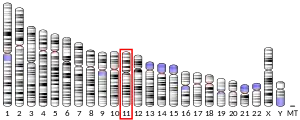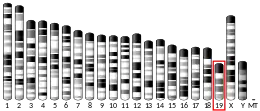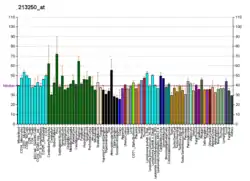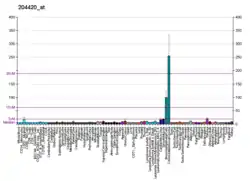FOSL1
Fos-related antigen 1 (FRA1) is a protein that in humans is encoded by the FOSL1 gene.[5][6]
Function
The Fos gene family consists of 4 members: c-Fos, FOSB, FOSL1, and FOSL2. These genes encode leucine zipper proteins that can dimerize with proteins of the JUN family, thereby forming the transcription factor complex AP-1. As such, the FOS proteins have been implicated as regulators of cell proliferation, differentiation, and transformation.[6]
Interactions
FOSL1 has been shown to interact with USF1 (human gene)[7] and C-jun.[7]
See also
References
- GRCh38: Ensembl release 89: ENSG00000175592 - Ensembl, May 2017
- GRCm38: Ensembl release 89: ENSMUSG00000024912 - Ensembl, May 2017
- "Human PubMed Reference:". National Center for Biotechnology Information, U.S. National Library of Medicine.
- "Mouse PubMed Reference:". National Center for Biotechnology Information, U.S. National Library of Medicine.
- Matsui M, Tokuhara M, Konuma Y, Nomura N, Ishizaki R (Mar 1990). "Isolation of human fos-related genes and their expression during monocyte-macrophage differentiation". Oncogene. 5 (3): 249–255. PMID 2107490.
- "Entrez Gene: FOSL1 FOS-like antigen 1".
- Pognonec P, Boulukos KE, Aperlo C, Fujimoto M, Ariga H, Nomoto A, Kato H (May 1997). "Cross-family interaction between the bHLHZip USF and bZip Fra1 proteins results in down-regulation of AP1 activity". Oncogene. 14 (17): 2091–2098. doi:10.1038/sj.onc.1201046. PMID 9160889.
Further reading
- Herdegen T, Leah JD (Dec 1998). "Inducible and constitutive transcription factors in the mammalian nervous system: control of gene expression by Jun, Fos and Krox, and CREB/ATF proteins". Brain Research. Brain Research Reviews. 28 (3): 370–490. doi:10.1016/S0165-0173(98)00018-6. PMID 9858769. S2CID 11848651.
- Reddy SP, Mossman BT (Dec 2002). "Role and regulation of activator protein-1 in toxicant-induced responses of the lung". American Journal of Physiology. Lung Cellular and Molecular Physiology. 283 (6): L1161–1178. doi:10.1152/ajplung.00140.2002. PMID 12424143.
- Maruyama K, Sugano S (Jan 1994). "Oligo-capping: a simple method to replace the cap structure of eukaryotic mRNAs with oligoribonucleotides". Gene. 138 (1–2): 171–174. doi:10.1016/0378-1119(94)90802-8. PMID 8125298.
- Tsuchiya H, Fujii M, Niki T, Tokuhara M, Matsui M, Seiki M (Dec 1993). "Human T-cell leukemia virus type 1 Tax activates transcription of the human fra-1 gene through multiple cis elements responsive to transmembrane signals". Journal of Virology. 67 (12): 7001–7007. doi:10.1128/JVI.67.12.7001-7007.1993. PMC 238160. PMID 8230424.
- Sinke RJ, Tanigami A, Nakamura Y, Geurts van Kessel A (Oct 1993). "Reverse mapping of the gene encoding the human fos-related antigen-1 (fra-1) within chromosome band 11q13". Genomics. 18 (1): 165. doi:10.1006/geno.1993.1447. PMID 8276409.
- Courseaux A, Grosgeorge J, Gaudray P, Pannett AA, Forbes SA, Williamson C, Bassett D, Thakker RV, Teh BT, Farnebo F, Shepherd J, Skogseid B, Larsson C, Giraud S, Zhang CX, Salandre J, Calender A (Nov 1996). "Definition of the minimal MEN1 candidate area based on a 5-Mb integrated map of proximal 11q13. The European Consortium on Men1, (GENEM 1; Groupe d'Etude des Néoplasies Endocriniennes Multiples de type 1)". Genomics. 37 (3): 354–365. doi:10.1006/geno.1996.0570. PMID 8938448.
- Arts J, Herr I, Lansink M, Angel P, Kooistra T (Jan 1997). "Cell-type specific DNA-protein interactions at the tissue-type plasminogen activator promoter in human endothelial and HeLa cells in vivo and in vitro". Nucleic Acids Research. 25 (2): 311–317. doi:10.1093/nar/25.2.311. PMC 146448. PMID 9016559.
- Pognonec P, Boulukos KE, Aperlo C, Fujimoto M, Ariga H, Nomoto A, Kato H (May 1997). "Cross-family interaction between the bHLHZip USF and bZip Fra1 proteins results in down-regulation of AP1 activity". Oncogene. 14 (17): 2091–2098. doi:10.1038/sj.onc.1201046. PMID 9160889.
- Smith CM, Ma NS, Nowak NJ, Shows TB, Gerhard DS (Aug 1997). "A 3-Mb contig from D11S987 to MLK3, a gene-rich region in 11q13". Genome Research. 7 (8): 835–842. doi:10.1101/gr.7.8.835. PMC 310665. PMID 9267807.
- Suzuki Y, Yoshitomo-Nakagawa K, Maruyama K, Suyama A, Sugano S (Oct 1997). "Construction and characterization of a full length-enriched and a 5'-end-enriched cDNA library". Gene. 200 (1–2): 149–156. doi:10.1016/S0378-1119(97)00411-3. PMID 9373149.
- Puntschart A, Wey E, Jostarndt K, Vogt M, Wittwer M, Widmer HR, Hoppeler H, Billeter R (Jan 1998). "Expression of fos and jun genes in human skeletal muscle after exercise". The American Journal of Physiology. 274 (1 Pt 1): C129–37. doi:10.1152/ajpcell.1998.274.1.C129. PMID 9458721.
- Finzer P, Soto U, Delius H, Patzelt A, Coy JF, Poustka A, zur Hausen H, Rösl F (Jul 2000). "Differential transcriptional regulation of the monocyte-chemoattractant protein-1 (MCP-1) gene in tumorigenic and non-tumorigenic HPV 18 positive cells: the role of the chromatin structure and AP-1 composition". Oncogene. 19 (29): 3235–3244. doi:10.1038/sj.onc.1203643. PMID 10918580.
- Udalova IA, Kwiatkowski D (Nov 2001). "Interaction of AP-1 with a cluster of NF-kappa B binding elements in the human TNF promoter region". Biochemical and Biophysical Research Communications. 289 (1): 25–33. doi:10.1006/bbrc.2001.5929. PMID 11708771.
- Jardine H, MacNee W, Donaldson K, Rahman I (Jun 2002). "Molecular mechanism of transforming growth factor (TGF)-beta1-induced glutathione depletion in alveolar epithelial cells. Involvement of AP-1/ARE and Fra-1". The Journal of Biological Chemistry. 277 (24): 21158–21166. doi:10.1074/jbc.M112145200. PMID 11912197.
- Wang HL, Wang J, Xiao SY, Haydon R, Stoiber D, He TC, Bissonnette M, Hart J (Oct 2002). "Elevated protein expression of cyclin D1 and Fra-1 but decreased expression of c-Myc in human colorectal adenocarcinomas overexpressing beta-catenin". International Journal of Cancer. 101 (4): 301–310. doi:10.1002/ijc.10630. PMID 12209953. S2CID 1982862.
- Bergman MR, Cheng S, Honbo N, Piacentini L, Karliner JS, Lovett DH (Feb 2003). "A functional activating protein 1 (AP-1) site regulates matrix metalloproteinase 2 (MMP-2) transcription by cardiac cells through interactions with JunB-Fra1 and JunB-FosB heterodimers". The Biochemical Journal. 369 (Pt 3): 485–496. doi:10.1042/BJ20020707. PMC 1223099. PMID 12371906.
External links
- FOSL1+protein,+human at the U.S. National Library of Medicine Medical Subject Headings (MeSH)
- FactorBook FOSL1
This article incorporates text from the United States National Library of Medicine, which is in the public domain.
This article is issued from Wikipedia. The text is licensed under Creative Commons - Attribution - Sharealike. Additional terms may apply for the media files.





